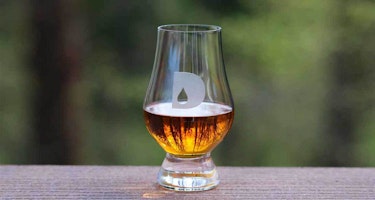All whiskey is made, in essence, from beer. Distiller’s beer, that is. It is a fundamental stage of the step-by-step process in which grains are turned into our beloved water of life. Today, more distillers are using actual beer. Beer that brewers would sell and that paying customers would enjoy is being used as the foundation for unique, experimental whiskeys loaded with hops and other sudsy characteristics.
Let’s begin with a quick overview of a few basic points. When fermentation occurs within the wort (a combination of grain, water and yeast), the result is called the wash. It’s also known as distiller’s beer. Typically between 7 and 10% ABV, it’s perfectly drinkable… although it usually doesn’t taste all that great. That’s because this beer was designed solely for the next stage of the process, distillation, as opposed to immediate consumption.
A brewer would have added hops and perhaps other spices and flavors. And they likely would have begun with different grain and yeast, for that matter. So what would happen if a true, finished beer was used at the starting point for distillation, rather than distiller’s beer?
The Brewstillery
Luckily, we’re starting to see more of these projects firsthand. In fact, in the craft world today, there’s a growing number of “brewstilleries”. These companies produce both beer and spirits, affording them the opportunity of using the former to make the latter.
As an example, look at Texas’s Ranger Creek. The brewery and distillery took their La Bestia Aimable, a Belgian dark strong ale, and distilled it into La Bestia Defavorable, what they describe as a Belgian white whiskey. Having sampled the beer and the whiskey side by side, the nose on the two was almost shockingly similar. It is a true showcase of how flavors and aromas can be passed through from beer to whiskey.
Some of the biggest names in craft beer are getting in on the spirits game, too. Look no further than Anchor Distilling Company, which over 20 years ago began as just an offshoot of Anchor Brewing. For the past three years, the two wings have collaborated for an annual holiday Christmas Spirit release, in which ADC distills AB’s rich, dark and spicy Christmas Ale into a white whiskey.
Other big name breweries show up in the whiskey realm, even if they haven’t yet turned one of their prized beers into a whiskey. For instance, Ballast Point uses their brewer’s malted barley to distill their Devil’s Share single malt. Same goes for Rogue and their now bustling Rogue Spirits lineup. Their Dead Guy Whiskey is distilled from the same three malts as their popular Dead Guy Ale. They also produce a Single Malt and Rye Whiskey, emphasizing their grains-to-glass farm operation. Dogfish Head now too operates a distillery, and the hope is that they move into whiskey after thus far focusing on gin and vodka.
Craft Collaborations
Shifting to collaborative efforts, Charbay Winery & Distillery is another notable example. In fact, they may have been the first to dabble in this department, beginning to use pilsner to distill their whiskey. There’s a fifth release on the way — and the fourth release was aged for 13.5 years. They’ve also used several beers from Bear Republic, including Racer 5 IPA and Big Bear Stout, as a base for other whiskeys.
It’s no surprise that old-school craft distilling stalwart St. George Spirits has gotten in on the act as well. Master Distiller Lance Winters was first a brewer, and he’s used Sierra Nevada ale as the foundation for their single malt and other assorted experiments and releases.
Always more to try
Elsewhere, Catoctin Creek Distillery partnered with Virginia neighbor Heritage Brewing for a limited edition Kings Mountain single malt release. They started with Heritage’s Kings Mountain Scotch Ale, and then aged the resulting distillate for a year in barrels that the brewery had already used. The resulting whiskey was filled with hops, malt, zest, and spice; basically a beer whittled down to its essence with an added kick. Which is indeed what is was, and that’s why these experimental releases are so fun when they’re executed properly.
In New Jersey, Cooper River Distillers has produced an entire lineup of limited edition whiskeys made from local breweries. This includes half a dozen from Philadelphia’s Saint Benjamin Brewing, such as their Single Run St. Benjamin’s IPA, along with collaborations with Tuckahoe Brewing and Flying Fish Brewing.
With all of the talent toiling away in America’s thousands of craft breweries and distilleries, and the increasing convergence between those two realms, expect much more in this realm in the years ahead.
If you’re interested in finding more whiskeys like these, get the Distiller app!
With Distiller, you’ll always know what’s in the bottle before you spend a cent. Rate, Review, and Discover spirits! Head on over to Distiller, or download the app for iOS and Android today!

